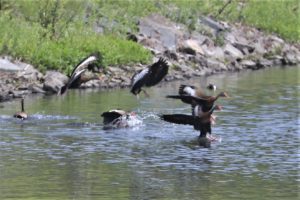This is New Hampshire Audubon’s Rare Bird Alert for Monday, June 7th, 2021.
During the Corona virus outbreak NH Audubon encourages you to enjoy birding safely; please follow travel and social distance recommendations from state and federal authorities.
6 BLACK-BELLIED WHISTLING-DUCKS were discovered at the Exeter Wastewater Treatment Plant on June 2nd, and were last reported on the 7th. Also present here during the past week were a BLUE-WINGED TEAL, a BUFFLEHEAD, and a RUDDY DUCK. The treatment plant is closed to all vehicles – please park in the parking lot and explore on foot only.

A pair of NORTHERN SHOVELERS was seen in Lancaster on June 3rd and 4th.
MISSISSIPPI KITES were seen in Durham, Newmarket, Greenland, and Stratham, all during the past week.
2 SANDHILL CRANES continue to be seen in Monroe and were last reported on May 30th.
A pair of RED-HEADED WOODPECKERS is nesting in Bear Brook State Park and was last reported on May 31st.
A YELLOW-BREASTED CHAT was photographed in Hampton on June 2nd.
An ACADIAN FLYCATCHER continued to be reported from Gile Road Marsh in Lee during the past week, and was last reported on June 5th. 1 was reported from Durham on the 3rd, and 1 was reported from Milton on the 4th.
A DICKCISSEL was reported from Indian Stream on June 6th.
An AMERICAN OYSTERCATCHER was seen again at the Isles of Shoals on June 4th, and 2 ARCTIC TERNS were seen there on the 5th.
A BLACK TERN was reported from Pontook Reservoir in Dummer on June 2nd.
3 CASPIAN TERNS were seen off of Odiorne Point State Park in Rye on June 1st.
A BONAPARTE’S GULL was reported from the Hinsdale Setbacks on the Connecticut River on June 4th.
A flock of 15 GLOSSY IBIS was photographed flying over Wakefield on June 5th.
An adult LITTLE BLUE HERON was seen in coastal Rye on June 7th, and 1 was seen at Deer Hill Wildlife Management Area in Brentwood on June 1st.
A GREAT EGRET was seen in Tuftonboro on June 4th.
A LEAST BITTERN was again reported from Great Meadow in Beaver Brook in Hollis on May 28th, and again on June 5th.
A COMMON GALLINULE was first seen on the coast just south of Odiorne Point State Park on May 30th, and was last reported from that area on June 6th.
A SORA continues to be seen at the Cranberry Ponds in West Lebanon and was last reported on June 2nd.
A SEMIPALMATED PLOVER was seen in Rochester on June 4th, and 1 was seen in Orford on the 3rd.
A few RED CROSSBILLS and WHITE-WINGED CROSSBILLS were reported from scattered locations during the past week.
3 RUSTY BLACKBIRDS were seen in Peterborough on June 1st.
A FOX SPARROW and 4 BICKNELL’S THRUSHES were reported from the Caps Ridge Trail off of Jefferson Notch Road in the White Mountains on June 5th.
A volunteer in the Mountain Birdwatch program reported highlights from a survey route in the White Mountains on June 6th, including: 39 BICKNELL’S THRUSHES, 58 BLACKPOLL WARBLERS, and 4 BOREAL CHICKADEES. The program is run by the Vermont Center for Ecostudies, and depends on volunteers.
This message is also available by phone recording: call (603) 224-9909 and press 4 as directed or ask to be transferred. If you have seen any interesting birds recently, you can leave a message at the end of the recording or send your sightings to the RBA via email. Please put either “bird sighting” or “Rare Bird Alert” in the subject line and be sure to include your mailing address and phone number.
Thanks very much and good birding.
Subscribe to New Hampshire Bird Records – learn more about birds and birding in New Hampshire (read a free article in each issue). This quarterly publication is produced by NH Audubon thanks to the work of many volunteers.
